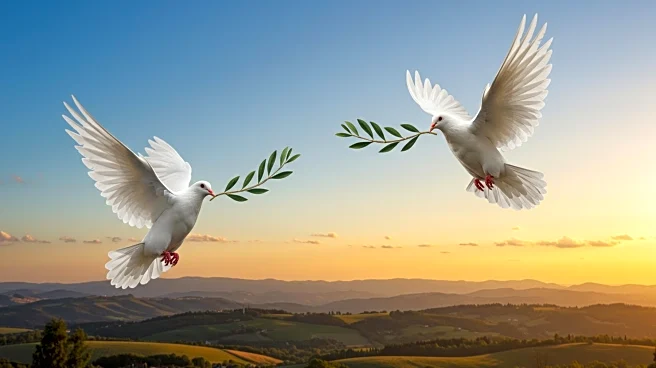What's Happening?
China has indicated its willingness to deploy peacekeeping forces to Ukraine if a ceasefire is reached, according to German media reports. This development comes as part of ongoing discussions about international security guarantees for Ukraine, which have been a focal point in U.S.-mediated peace talks between Russia and Ukraine. China's proposal is contingent upon a United Nations mandate, highlighting the complexity of international involvement in the conflict. The idea of deploying peacekeeping forces has been met with mixed reactions. Some view the involvement of non-Western countries as potentially more palatable to Russia, while others express concern that China might use the opportunity to align with Russia rather than maintain neutrality. The proposal is part of broader efforts by a coalition of European allies, including the U.K., France, Lithuania, and Estonia, who have expressed readiness to send troops to Ukraine. However, Russia has firmly opposed the idea, labeling it as foreign military intervention.
Why It's Important?
The potential deployment of Chinese peacekeeping troops to Ukraine represents a significant shift in the international dynamics surrounding the conflict. China's involvement could alter the balance of power and influence in the region, potentially affecting the strategies of Western allies and Russia. For Ukraine, the presence of international peacekeepers could provide much-needed security guarantees, which are crucial for any sustainable peace agreement. However, the involvement of China, a major global power with its own strategic interests, could complicate the situation. The U.S. has ruled out sending its own troops but remains open to providing other forms of security support. The mixed reactions to China's proposal underscore the geopolitical complexities and the delicate balance of interests at play in the region.
What's Next?
The next steps involve further diplomatic negotiations to determine the feasibility and conditions under which peacekeeping forces could be deployed. The United Nations' role will be critical, as any deployment would require its mandate. The international community will closely monitor Russia's response, as its acceptance or rejection of foreign troops will significantly impact the peace process. Additionally, the coalition of European allies will need to coordinate their efforts and strategies to ensure a unified approach. The situation remains fluid, with potential implications for international relations and regional stability.










